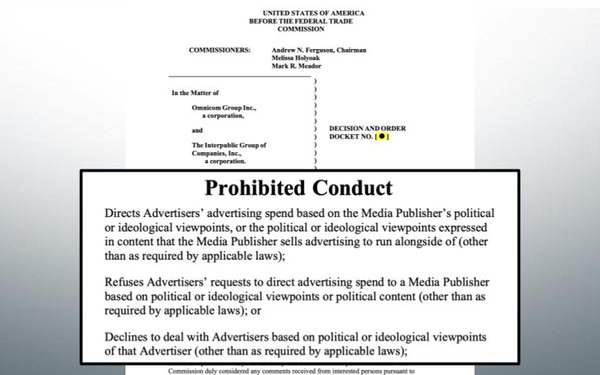
The Federal Trade
Commission issued a proposed consent order that would allow the Omnicom-IPG combination to go through but that would include a series of provisions that would
“eliminate Omnicom’s ability to deny advertising dollars to media publishers based on their political or ideological viewpoint, except at the express and individualized direction of
Omnicom’s advertiser customers,” according to a statement released by the FTC today.
“We are delighted that our transaction with Interpublic has cleared this
significant regulatory hurdle,” said John Wren, Chairman & CEO of Omnicom. “This is an important step toward the completion of the proposed acquisition." IPG CEO Philippe Krakowsky
concurred: “Today’s news is a notable step forward in the process of combining our companies."
advertisement
advertisement
The proposed order will not
become final until the FTC has considered reactions from a 30-day public comment period.
The Commission vote to issue the complaint and accept the consent agreement for public
comment was 2-0-1, with Commissioner Mark R. Meador recused.
“Websites and other publications that rely on advertising are critical to the flow of our
nation’s commerce and communication,” stated Daniel Guarnera, Director of the FTC’s Bureau of Competition. “Coordination among advertising agencies to suppress
advertising spending on publications with disfavored political or ideological viewpoints threatens to distort not only competition between ad agencies, but also public discussion and debate. The
FTC’s action today prevents unlawful coordination that targets specific political or ideological viewpoints while preserving individual advertisers’ ability to choose where their ads are
placed.”
A complaint filed in June by the FTC’s Bureau Of Competition challenging the Omnicom-IPG merger on antitrust
grounds specifically referenced the Global Alliance For Responsible Media, a group founded under the auspices of the World Federation Of Advertisers, whose primary mission was
to establish standards for brand safety. Omnicom and IPG were founding members along with multinational brand advertisers.
“GARM
claimed that it was established because member advertisers did not want their ads to appear alongside material that could tarnish their brand’s reputation,” the complaint stated.
“The supposedly harmful content typically involved websites and outlets that, in GARM’s view, promoted “misinformation” — a nebulous term that
was ultimately used to sweep in many types of legitimate political speech.”
Last year social media platform X, owned by Elon Musk, sued
GARM on antitrust grounds for alleging that the group recommended that advertisers not buy advertising on the platform. GARM shut down shortly afterward, saying it did not have the resources to defend
the suit.
The complaint indicated the FTC had “reason to believe” the law was violated. If the consent order is finalized, Omnicom
and IPG would agree to the terms going forward without acknowledging any prior wrongdoing.
The proposed order — assuming it is finalized
— is a major hurdle cleared by Omnicom and IPG on the regulatory front.
A handful of other countries have cleared the merger, although the UK launched an official probe just last
week.
This story has been updated with comments from Omnicom and IPG.